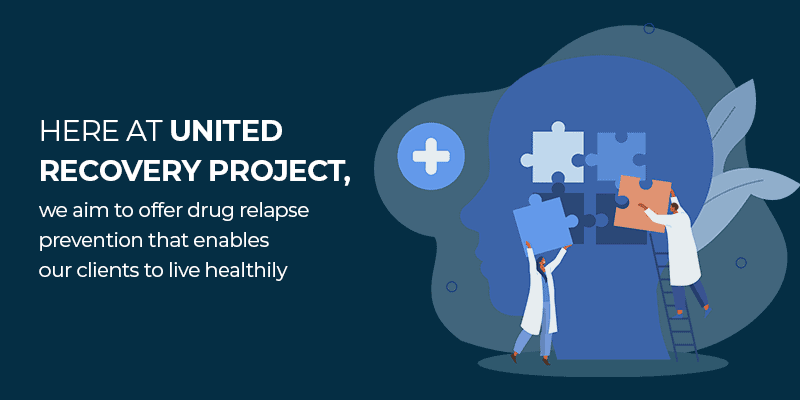Drug Relapse Prevention in New York
Table of Contents
Drug addiction recovery is a lifelong journey that requires persistence and fierce determination. While some individuals can avoid drugs after treatment, others pick up their old habits and start using again. Even though it might feel like it at the time, relapsing doesn’t mean you failed. Relapse is merely a hurdle that many of us face on our recovery journeys. The important part is learning how to get back on track and overcome relapse. In the end, you don’t want to lose sight of your long-term goal: lifelong sobriety. Fortunately, drug and alcohol rehabilitation centers teach invaluable skills that enable recovering addicts to adopt healthy coping mechanisms. Instead of turning to drugs and alcohol, individuals can practice these coping mechanisms to reduce stress and overcome whatever life throws in their direction.
According to the New York State Department of Health, more than 1.9 million New Yorkers suffer from substance abuse disorder. Although thousands of New Yorkers receive treatment each year, not all of them can refrain from using drugs. Data from the National Institute on Drug Abuse shows that approximately 40 – 60% of drug addicts relapse at some point in their life. Why is this number so high? Relapse is commonplace due to addiction’s chronic nature. Addiction alters the brain’s natural balance, making it challenging to stop using drugs. Fortunately, various treatment programs tackle the issue of relapse. These therapies help addicts learn to manage stressors and triggers without turning to substances. At United Recovery Project, we offer best-in-class New York drug relapse prevention that allows our clients to succeed on their recovery journeys without resorting to drugs.
Preventing a relapse means you have to be mindful of the warning signs. No two people experience the same relapse warning signs. Someone could experience a full-fledged relapse within a couple of days, whereas another could relapse over several months. Preventing a relapse means you have to be mindful of the warning signs. You also need to be in the right mindset or have a solid support system that can watch out for you.

Drug Addiction Relapse Stages
Despite some misconceptions, drug addiction relapse happens gradually. You’ll experience precursors before using drugs again. The three stages are emotional, mental, and physical relapse. Let’s look at each stage and discuss what each entails:
- Emotional relapse: if you feel down or depressed, you might be entering the emotional relapse stage. Your negative thoughts might become overwhelming, leading you to neglect self-care. You may find yourself eating unhealthy, staying in bed all day, or not practicing good hygiene. People around you may notice your behavior change, including family and co-workers. Those in the emotional relapse stage don’t typically think about drugs yet. Instead, the depressive thoughts take precedence, and increased depression and anxiety become a reality. If you don’t stop relapsing during the emotional phase, you’re at risk of experiencing a mental and physical relapse.
- Mental relapse: You already feel down in the trenches by the time you reach mental relapse. However, the negative thoughts experienced during mental relapse are a step above emotional relapse. But, what’s the difference? During mental relapse, you generally start to think about the drugs you used before. For instance, you might fantasize about the euphoric-like high you felt when using heroin. As you continue to encounter this thought, it’ll become more difficult to resist using drugs. You may think: “I’ll just take one; it won’t hurt me.” All addicts know this isn’t the case. Reusing drugs just once can quickly turn into an all-out relapse.
- Physical relapse: The last stage is physical relapse. As the name suggests, physical relapse is when you start to retake drugs. Most individuals begin using again to overcome the feelings of emotional and mental relapse. Instead of using coping mechanisms to deal with your internal battles, you conclude that drugs are the best way to numb your thoughts. Many people begin using small amounts of drugs here and there, eventually becoming hooked. Therefore, it’s essential to seek treatment as soon as you start to experience the signs of emotional relapse. It can take much longer to recover if you let yourself reach physical relapse. If you experience any of the above stages of relapse, you should seek treatment from a professional drug rehabilitation center.
Tips And Tricks To Prevent A Relapse
During New York drug relapse prevention, you’ll learn healthy coping mechanisms that help you avoid relapse as you practice lifelong sobriety. Although relapsing isn’t uncommon, there are various tips and tricks to prevent a relapse:
- Think about the consequences of drug use: Take a step back and think about your life when you were addicted to drugs. What happened to your professional and personal relationships? Now that you have made so much progress on your journey, how have these relationships improved? Reusing drugs can ruin your rekindled relationships and your relationship with yourself. Remember that you are worth it, and you have the resilience to overcome temptations!
- Look out for the stages of relapse: Always be mindful of the three stages of relapse: emotional, mental, and physical relapse. Don’t shrug off persistent negative thoughts, as they could signal you’re beginning to relapse. Remember, relapse doesn’t occur overnight. If you’re experiencing any relapse symptoms, there’s still time to seek professional help and avoid reusing.
- Practice healthy habits: Those who undergo addiction treatment learn to practice healthy habits that empower them to recover. This often includes maintaining a fixed schedule, working out, and eating nutritious food. Don’t look at “routine” as a bad thing – it can work wonders when you’re recovering from substance abuse!
- Understand your triggers: We all have things that bother us and make us feel down and depressed. However, we can’t ignore what brings us negative emotions. Instead, we have to learn how to identify our triggers and understand them. When something triggers an addict, they must know to look the other way and find a way to get the trigger off their mind. For instance, imagine you saw a close friend taking drugs at a party (the same drugs you used). You’re left with the persistent craving to take a little bit yourself, but you know it would throw you off track. Instead of succumbing to temptation, you immediately meditate as soon as you arrive home. The thirty-minute meditation session clears your mind and infiltrates you with positive thoughts.
Drug Relapse Prevention At United Recovery Project
Do you feel like you’re on the verge of drug relapse? If so, please reach out to us today. Our team can help you avoid relapse and maintain sobriety. And even if you have relapsed, we can get you back on track. Remember, relapse isn’t failure – it’s just a step backward in your recovery journey.Choose United Recovery Project – home to the leading drug relapse prevention program.
- Programs
- Women’s Detox Program
- Prescription Drug Detox Program
- Opioid Detox Program
- Opiate Detox Program
- Men’s Detox Program
- Meth Detox Program
- Medical Detox Program
- Holistic Detox Program
- Heroin Detox Program
- Drug Detox Program
- Relapse Prevention
- Psychotherapy Program
- Nutritional Education
- LGBTQ-Friendly Program
- Group Therapy
- Dialectical Behavior Therapy
- Cognitive-Behavioral Therapy
- Anger Management Therapy And Substance Abuse Detox
- 12 Step
- Detox Therapy Programs
- Alcohol Detox Program
- Cocaine Detox Program
- Benzo Detox Program
- Women’s Rehab Center
- Transitional Living Program
- Transitional Living Program
- Sober Living Homes
- Residential Rehab Programs
- Residential Addiction Rehab
- United Recovery Project | Drug Relapse Prevention
- Alcohol Detox Center
- Alcohol Detox Center
- Rehab Alumni Program
- Rehab Aftercare Program
- Rehab Aftercare Program
- Partial Hospitalization Program
- Outpatient Drug and Alcohol Rehab
- Medical Detox Center
- Intensive Outpatient Program (IOP)
- Holistic Drug Detox
- Heroin Detox Center
- Heroin Detox Center
- Dual Diagnosis Programs in New Jersey
- Drug Relapse Prevention in New Jersey
- Dual Diagnosis Programs in New York
- Drug Relapse Prevention in New York
- Dual Diagnosis Programs
- Drug Relapse Prevention
- Drug Relapse Prevention
- Rehab Alumni Program
- Alcohol and Drug Addiction Aftercare Programs
- Women’s Rehab Center
- Sober Living Homes
- Residential Rehab Programs
- Dual Diagnosis Programs
- Outpatient Drug and Alcohol Rehab
- Intensive Outpatient Program (IOP) For Addiction
- Partial Hospitalization Program (PHP)
- Residential Addiction Rehab
- Holistic Drug Detox
- Medical Detox Center
